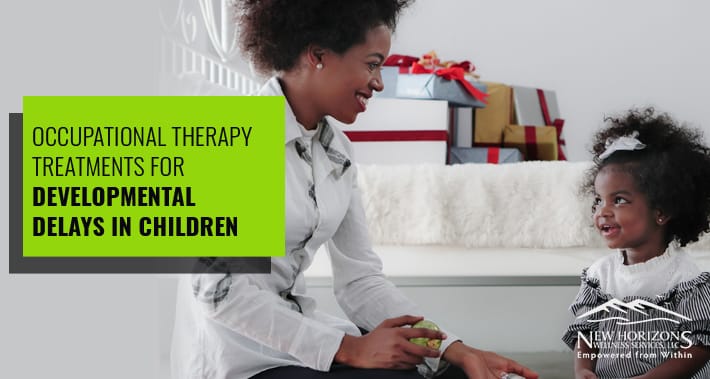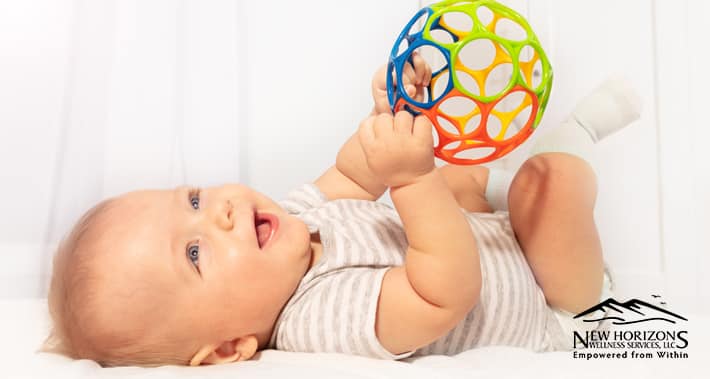
If your child is experiencing a developmental delay, you may be facing a lot of mixed emotions.
You might be feeling worried about your child’s future.
Or perhaps you’re feeling overwhelmed with trying to find the best treatment option for your child.
Fortunately, there is help.
At New Horizons Wellness Services, our qualified occupational therapists can help identify and provide solutions for developmental delays in children.
Occupational therapy for kids is an ideal treatment option for developmental delays and can help your child become fully independent in their environment.
Keep reading to learn more about developmental delays in children and how occupational therapy can help.
What Is A Developmental Delay?
During their first 5 years of life, children’s developmental stages typically follow a predictable timeline.
These stages are known as “developmental milestones”.
As they reach each milestone, your child develops skills in many different developmental domains, including:
- Language skills,
- Physical skills,
- Gross motor skills,
- Fine motor skills, and
- Social skills
In children with developmental delays, performing tasks or activities related to these developmental domains is difficult.
For instance, if your child is struggling with a developmental delay in their fine motor skills, they may struggle to dress themself.
Developmental delays can cause your child to have difficulties in multiple domains, or multiple difficulties in a single domain.
How To Tell If Your Child Has A Developmental Delay?
In order to identify a developmental delay in your child, you will need to pay close attention to their developmental milestones.
While every child is unique and develops at their own rate, there are some guidelines of typical ages of milestone achievement.
Let’s take a closer look at some of the developmental milestones you can expect your child to reach.
By 3 Months
By 3 months, your child should be starting to develop the following motor skills:
- Reach for objects
- Grasp and holding objects
- Support their head on their own
- Bring objects down to their mouth
- Push down with their legs while on a firm surface
By 3 months, your child should be starting to develop the following personal and social skills:
- Smile at people
- Notice new faces
By 3 months, your child should be starting to develop the following communication skills:
- Respond to loud noises
- Imitate sounds, if poorly
By 7 Months
By 7 months, your child should be starting to develop the following motor skills:
- Reach with one hand
- Take objects to their mouth
- Roll over in both directions
- Sit up without help
- Weight bear through their legs when pulled into a standing position
By 7 months, your child should be starting to develop the following personal and social skills:
- Enjoy cuddles
- Show affection for parents
- Show enjoyment around people
- Be comforted at night
- Smile without prompting
- Laugh or squeal
- Take interests in games, such as peek a boo
By 7 months, your child should be starting to develop the following communication skills:
- Respond to sounds
- Look in the direction of sounds
By 1 Year
By 1 year, your child should be starting to develop the following motor skills:
- Crawl
- Stand with support
By 1 year, your child should be starting to develop the following personal and social skills:
- Share back and forth sharing of sounds, smiles, or facial expressions
- Share back and forth gestures, such as waving, reaching, or pointing
By 1 year, your child should be starting to develop the following communication skills:
- Use single words, like “mama”
By 1 year, your child should be starting to develop the following thinking skills:
- Search for objects that are hidden
- Use gestures, such as waving or pointing
By 2 Years
By 2 years, your child should be starting to develop the following motor skills:
- Walk in a heel to toe walking pattern
- Ability to push a wheeled toy
By 2 years, your child should be starting to develop the following communication skills:
- Speak in at least 15 words
- Use two word phrases
- Use speech to communicate more than just immediate needs
By 2 years, your child should be starting to develop the following thinking skills:
- Know the function of common objects
- Follow simple instructions
- Imitate actions or words

How Can Occupational Therapy For Kids Help?
If you suspect that your child may be struggling with a developmental delay, it is important to identify and treat the delays as soon as possible.
Early detection and treatment of developmental delays will help to minimize the risk of your child’s developmental delays causing severe consequences later in life.
Occupational therapists are trained to help detect a developmental delay.
Your child’s occupational therapist will start by asking you questions about your child’s development, as well as carry out tests to assess your child’s motor skills, sensory perception, and cognitive abilities.
Occupational therapy uses numerous techniques to help your child become independent in their environment.
Play is one of the most common intervention techniques.
For instance, your child’s occupational therapist may introduce costumes to help your child gain the skills to get dressed on their own.
The use of games is helpful because they encourage your child to get involved in their treatment, as well as help them develop a positive attitude towards performing tasks.
If your child’s occupational therapist notices they’re having difficulty with their speech and language development as well, they may refer you to a pediatric speech therapist in Tigard Oregon.
Book Your Appointment With New Horizons Wellness Services Today
If your child is experiencing developmental delays, don’t wait to begin treatment.
At New Horizons Wellness Service, we are dedicated to providing the highest quality of care.
Book your appointment with New Horizons Wellness Services today

Yours in Health,
New Horizons Wellness Services13333 SW 68th Pkwy,
Tigard, OR 97223
- https://g.page/newhws
New Horizons Wellness Services provides a true multidisciplinary approach to mental & physical health treatments for children, adults and families.